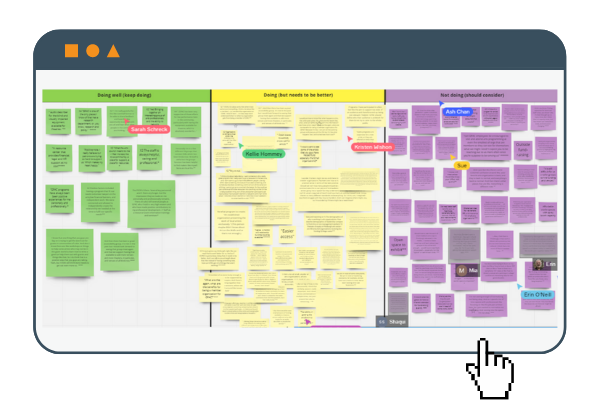Town Hall Update: Process
This article is the first of a three-part series.
The last two years have changed the way we work, play, and experience our communities. All of us at the Arts Council felt these changes in our work, personally and professionally. To be responsive to our communities changing needs, we held a series of three town hall meetings that illuminated how our role in the arts community must stay steady and change.
We’re sharing the results of these town halls so you can learn with us and apply findings that speak to you in your own organizations or arts practice. It’s our hope that by sharing this information, Pittsburgh’s arts and cultural practices may be strengthened in the years to come.
Our goal for town halls was to center your voices in our decision-making process.
It is our mission to serve this region’s arts and cultural community. These town halls were structured to collect feedback from arts supporters in three audience groups: the public, artists, and arts organizations. Conversations focused on trends, capacity, and potential programs. These Town Halls were held in tandem with surveys intended to allow for an additional method of feedback. This feedback will be used by the Arts Council to improve our offerings, as well as by the larger community to react to the needs expressed.
Staff passion and collaboration pushed this project forward.
The Arts Council often circulates surveys to better understand the local environment. However, our Manager of Programs, André Solomon, saw the exceptional benefit in leaning toward open dialogue as feedback following staff listening sessions in June of 2021. With support from the Manager of Research and Special Projects, Morgan Kasprowicz, and Manager of Marketing, Sarah Schreck, three town halls were planned to hear from the greater Pittsburgh arts ecosystem.
In total, we met over 60 of you face-to-face, and 59 responses were gathered across public, artist, organization, and board surveys.
Participants in both our town halls and surveys wore multiple hats within the arts community, working as any combination of artist, cultural worker, educator, administrator, audience member, or supporter. Most Arts Organization Town Hall attendees reflected small or medium-size organizations.
Of the artists who responded to our surveys (n=27), 60% had been creating art in the Pittsburgh area for over 10 years, and only 18% could confirm that they were members of the Arts Council. Organizations who participated in surveys (20) tended to be smaller organizations with budgets under $250K (55%), or medium organizations with a budget between $250K – 999K (40%). The arts supporters who responded (6) represented hobbyists or arts business retirees.
Arts Council staff used a Miro board to help organize the town hall feedback into themes and categories.
We examined the data to better serve you.
To better serve our mission, the Arts Council’s full staff reviewed town hall transcripts and survey data to look for:
- What the Arts Council does well and should continue to do
- What the Arts Council does but should improve
- What the Arts Council does not do but should consider doing
Our entire staff came together for two full sessions of planning, including picking out patterns in feedback, and articulating on findings. We then used these findings to ideate, discuss, and confirm our next steps.
Next week, look for our post detailing our findings from the town halls and surveys.
We will share our findings, including their supporting quotes pulled directly from the town halls and surveys. Please note, we will not be publishing the entire transcripts of our town halls to preserve the anonymity of participants and avoid allowing conversational context to override privacy. We will make quotes available and will categorize them by theme in our next blog post.
If you have any questions or want to learn more about the Town Halls, please contact Sarah Schreck.

